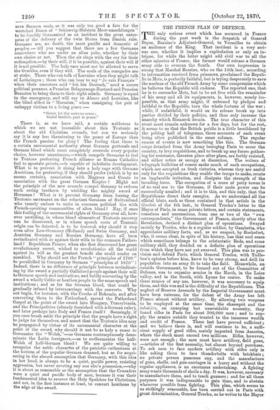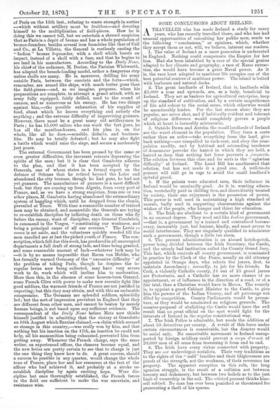THE FRENCH PLAN OF DEFENCE.
THE only serious event which has occurred in Franca during the past week is the despatch of Genera} Boyer, Bazaine's Adjutant-General, to Versailles to obtain an audience of the King. That incident is a very seri- ous one, whether it implies a capitulation or only an in- trigue, for while the latter might add civil war to all the other miseries of France, the former would release a German army able to overrun the South. Our own impression is strong that Marshal Bazaine, who on the 16th inst., according to information received from prisoners, proclaimed the Repub- lic in Metz, is perfectly faithful, but is trying desperately to save the nucleus of the old French Army by some compromise which he believes the Republic will endorse. The reported one, that he is to surrender Metz, but to be set free with the remainder of his army and all its equipments, is, however, nearly im- possible, as that army might, if unbound by pledges and- faithful to the Republic, turn the whole fortune of the war ; while, if unfaithful, it would on its release break up into parties divided by their politics, and thus only increase the anarchy which Bismarck dreads. The true character of this event must remain unknown for a few days, but for the rest„ it seems to us that the British public is a little bewildered by the pelting hail of telegrams, three accounts of each event being often published in the same column. The regular course of events is now something like this. The German, corps detached from the Army besieging Paris to scour the country, to levy requisitions, and to break up any forces gather- ing for resistance, threaten place after place, are feebly resisted, and either retire or occupy at discretion. The writers of " telegraph bulletins of course make much of such occupations,. which are accepted as fresh victories, whereas they are useful only for the requisitions they enable the troops to make, create an implacable irritation, and dissipate the strength of the - invading force. The occupation of a score of petty towns is- of no real use to the Germans, if their main power can be successfully assailed ; and it is to this, and this only, that the Republicans direct their energies. As we understand all the • official hints, such as those contained in that article in the Gaulois of the 4th inst., in General Trochu's letter to the- Mayor of Paris, in some private letters, and certain statements, conscious and unconscious, from one or two of the "own correspondents," the Government of France, shortly after the Revolution, devised a distinct plan of operations. Swayed mainly by Trochu, who is a regular soldier, by Gambetta, who - appreciates military facts, and, as we suspect, by Rochefort, who, it seems clear, in spite of his history, has that cool sense- which sometimes belongs to the aristocratic Reds, and some military skill, they decided on a definite plan of operations. from which they have not yet swerved. This plan was to pro- vision and defend Paris, which General Trochu, with Todle- ben's opinion before him, knew to be very strong, and drill its population into an army fit to take the field. Meanwhile, an outside Government, to be formed out of the Committee of Defence, was to organize armies in the North, in the Loire - valley, and in the South, with Lyons for centre. To make- these armies of any use, however, it was necessary to equip them, and this was and is the difficulty of the Republicans. The neglect of Reserve Arsenals by the Imperial Government must. have been extreme, for the defeat of the Army has left France almost without artillery. By allowing two weapons to be employed at the same time, the chassepot and the- tabatire, an annoying but unavoidable necessity, they- found rifles in Paris for about 300,000 men ; and to sup- ply the armies outside they trusted to the immense wealth and credit of France. These last have proved sufficient ;. and we believe there is, and will continue to be, a suffi- cient supply of good rifles, mainly imported from America,. where the stock must exceed two millions. Rifles, however, were not enough ; the men must have artillery, field guns,. —articles of the first necessity, but almost beyond purchase. To ask men to face modern artillery with rifles only is. like asking them to face thunderbolts with brickbats ; no private person possesses any, and the manufacture. of guns, shells, and gun-carriages in a hurry and without the regular appliances, is an enormous undertaking. A fighting army wants thousands of shells a day. It was, however, necessary to manufacture them, and to teach gunners ; and for all these purposes it was indispensable to gain time, and to abstain whenever possible from fighting. This plan, which seems to- ns strikingly reasonable, has been carried out in Paris with great determination, General Trochu, as he writes to the Mayor of Paris on the 15th inst., refusing to waste strength in sorties —which without artillery must be fruitlessand devoting himself to the multiplication of field-pieces. How he is doing this we cannot tell, but we entertain a shrewd suspicion that as Paris is a depot of bronze and has a whole population of bronze-founders, besides several iron foundries like that of Call and Co., at La Villette, the General is restlessly casting the " Indian " bronze 9-pounder, with a shell which bursts on impact, instead of a shell with a fuse, and that he begins to see land in his manufacture. According to the Daily News, his chief' of the ordnance, M. Dorian, the Parisian Whitworth, has adopted the breech-loading model, rather a dangerous step unless shells are many. He is, moreover, drilling his army outside Paris, between the enceinte and the forts—which, remember, are armed like ships, with much better guns than the field-pieces—and, as we imagine, proposes, when his preparations are complete, to attempt a grand attack, with an army fully equipped, fairly drilled, used to the sound of cannon, and as numerous as his enemy. He has two things against him,—the possible exhaustion of his supplies of food, about which he knows everything and nobody else anything ; and the extreme difficulty of improvising gunners. However, there must be a great many old artillerymen in Paris ; he has 15,000 sailors who can work the fort guns, he has all the omnibus-horses, and his plan is, on the whole, like all he does,—sensible, definite, and business- like. He may be totally defeated ; but he may also fight a battle which would raise the siege, and secure a moderately just peace.
The external Government has been pressed by the same or even greater difficulties, the incessant retreats depressing the spirits of the men; but it is clear that Gambetta adheres to the plan, and that it has been accepted by the Generals, one of whom states in a formal report on the defence of Orleans that he retired beyond the Loire and abandoned the city because, though he had guns, he had not yet gunners. The manufacture of gunners is a most difficult task, but they are coming up from Algeria, from every port of France, and, as we have a strong suspicion, from one or two other places, M. Gambetta having abandoned the extraordinary system of haggling which, until he dropped from the clouds, prevailed at Tours. With time a reasonable number of trained men may be obtained, and meanwhile the Generals are trying to re-establish discipline by inflicting death on those who fly before the enemy, want of discipline, says General Cambriels, in command in the Vosges, "constituting our weakness, and being a principal cause of all our reverses." The Levee en masse is set aside, and the volunteers quickly weeded till the men enrolled are at last the picked youth of France. The con- scription,which fell due this week, has producedin all unoccupied departments a full draft of strong lads, and time being granted, and some reasonable amount of luck—whatever luck may be —it is by no means impossible that Baron von Moltke, who has formally warned Germany of the "excessive difficulty" of the problem of taking Paris, though he despises the ir- regular levies now being collected, may have very severe work to do, work which will incline him to moderation. More than this, in the absence of some heaven-born General, some French Clive with power to make new recruits fight like good soldiers, the warmest friends of France are not justified in expecting; but this they may obtain, and with this an endurable compromise. The Germans are splendid soldiers, splendidly led; but the sort of impression prevalent in England that they are different from other men, and cannot be beaten by merely human beings, is not based upon any sufficient evidence. The correspondent of the Daily News before Metz now thinks himself justified in admitting that the victory at Gravelotte on 16th August which Bazaine claimed,—a claim which seemed so strange in this country,—was really won by him, and that nothing but his inaction on the 17th, an inaction he could not help, all his ammunition being exhausted, prevented him from getting away. Whenever the French charge, says the same writer, an experienced 'officer, the chances become equal, and the new levies are pretty certain to see that to charge is just the one thing they know how to do. A great success, should a success be possible in any quarter, would change the whole tone of France, place her and her resources at the feet of the officer who had achieved it, and probably at a stroke re- establish discipline by again exciting hope. Were dis- cipline but once thoroughly established, the French forces in the field are sufficient to make the war uncertain, and resistance wise.































 Previous page
Previous page